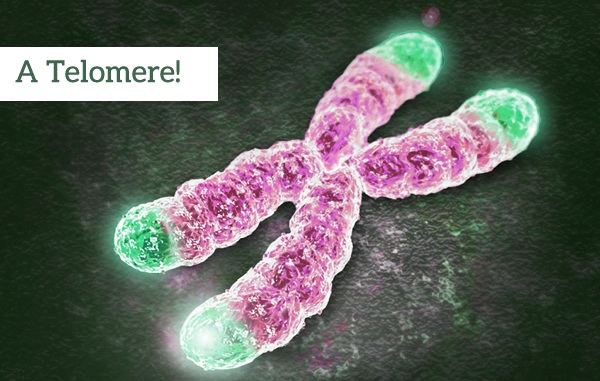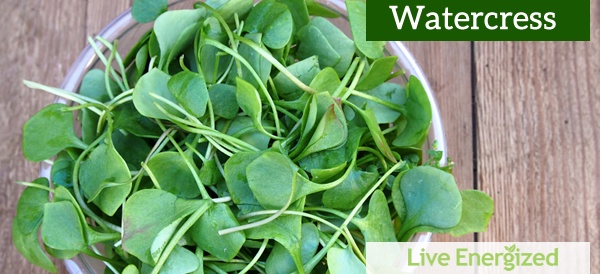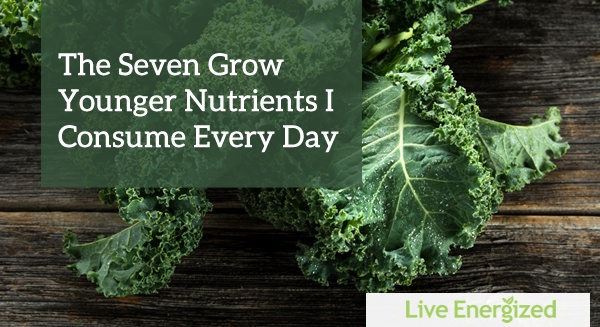The 7 “Abundant-Youth” Nutrients I Consume Daily
Wouldn’t you love to have the keys to abundant youth?
It sounds like something from a Disney movie…but it exists!
Let me explain…
Scientific research has now proven, through the study of something known as ‘telomeres’ that nutrition might be able to turn back the clock – a little at a time…
And the science, without any doubt, has proven that what you eat and drink on a daily basis can either SPEED the clock, OR actually slow your rate of biological aging.
It’s an incredible breakthrough, truly exciting, and once again proves that we have got SO much control over our health and body through the choices we make about what we put in our mouths…
The Key to Abundant Youth is…
An emerging body of nutritional science has uncovered that telomere length is the key to abundant youth, and that what you eat – antioxidants in particular – play a critical role in reversing aging, by lengthening your telomeres.
“Oxidative stress accelerates telomere loss, whereas antioxidants decelerate it.” — Journal: Trends in Biomedical Sciences, 2002
What is a Telomere?

It looks like a fizzy worm lolly, but a telomere is a repeating sequence of DNA at the end of a chromosome.
Stick with me…
Each time a cell replicates and divides, the telomere loses some of its length. Eventually the telomere runs out, and the cell can no longer divide and rejuvenate, triggering a poor state of cell health that contributes to disease risk and eventual cell death.
It’s been proven that telomere shortening is linked to decreased immune functioning, type 2 diabetes, neurodegenerative diseases, premature aging, cancer and a higher risk of death.
Not so good, but the better news is, we can help prevent shortening and actually increase the lengthening!
Sound good?
So, How do You Keep Them Long and Good Quality?!
We can do huge amounts to impact the length and quality of our telomeres. It again, comes down to those three factors of eating antioxidants, anti-inflammatory foods and alkaline mineral-rich foods.
And when it comes to telomeres, there are eight principle nutrients to aim for, and below I give you the seven delicious foods I consume on a daily basis that give you an abundance of these nutrients – yep, an absolute ABUNDANCE!
Here’s a List of Those Seven Nutrients:
- Antioxidants: primarily polyphenols, cartenoids, lignans, flavanoids & beta-carotene
- Omega 3: from fish, krill and/or flax
- Folate
- Vitamin D
- Vitamin E
- Alkaline Minerals: magnesium, potassium, manganese in particular
- Vitamin K
- Co-Q10
And these are easy to get every day when you focus on foods that are alkaline forming, antioxidant-rich and anti-inflammatory!
The Seven Grow-Younger Nutrients I Consume on a Daily Basis
#1: Capsicum (Bell Pepper)

The antioxidant superpower, bell pepper is one of my all-time-favourites because it is sweet, crunchy and refreshingly delicious and so it’s easy to have every single day and never get bored of it.
You can use it in almost any meal raw, grilled, fried, roasted and it is always a winner.
And it’s an antioxidant powerhouse.
Here are just SOME of the telomere-lengthening antioxidants bell pepper contains:
- Flavonoids
- luteolin
- quercetin
- hesperidin
- Carotenoids
- alpha-carotene
- beta-carotene
- cryptoxanthin
- lutein
- zeaxanthin
- Hydroxycinnamic Acids
- ferulic acid
- cinnamic acid
Of these, the carotenoids are the most interesting.
Carotenoids are highly researched and get a lot of attention in the health field…and bell peppers contain over 30 different members of the carotenoid nutrient family.
Bell peppers have shown up in research relating to decreasing the risk of cardiovascular disease, type II diabetes, macular degeneration, cancer, inflammation and more.
Alongside these lesser known or more complex-named antioxidants, bell pepper is one of, if not the best food source of the more common antioxidants: vitamin C, vitamin A and vitamin E.
In fact, bell peppers contain twice as much vitamin C as oranges.
In terms of antioxidant content and telomere-strengthening, bell pepper is right up there at the top of my picks.
How to Get Daily: simply a snack, raw with dips; as a dip/spread in it’s own right; juiced into vegetable juices; made in raw soups;
➞Starter Recipes: Delicious Red Pepper, Walnut Omega Dip | Alkaline Stuffed Peppers
#2: Spinach

If antioxidants, anti-inflammatory agents and immune-boosting nutrients are the key ingredients for strong telomeres, it’s easy to see why you have to eat spinach every day.
Firstly, 1 cup of spinach contains 987% of your daily Vitamin K RDA – that’s huge.
Plus, researchers have found more than a dozen different flavonoids in spinach that make it a wonderfully-easy-to-consume anti-inflammatory and anti-cancer powerhouse.
The beauty of spinach is that most of the flavonoid and carotenoid nutrients found in spinach provide not only amazing anti-inflammatory benefits but they also provide massive antioxidant benefits as well.
Given the fact that spinach is an excellent source of other, more commonly known antioxidant nutrients — including vitamin C, vitamin E, vitamin A plus manganese and heaps of magnesium —as well as being a very good source of the antioxidant zinc and a good source of the antioxidant selenium, it’s no wonder that spinach has been proven to reduce oxidative stress and thus improve telomere length and quality.
How to Get Daily: wilted and served with cooked breakfasts; in juices, soups, salads & smoothies; blended or wilted into pasta sauces & curry sauces;
➞Starter Alkaline Recipes: Energy Doubling Smoothie | Alkaline ‘Raw’ Soup
#3: Ionized Water

Water that has been ionized, through a high quality water ionizer (such as the Chanson MAX) has huge antioxidant capacity.
Measured in Oxidation Reduction Potential (ORP), the water from an ionizer has more of an antioxidant capacity than green tea.
It’s so awesome and beneficial because it’s your WATER – you’re drinking glasses and glasses of it all day, every day.
I could talk about the benefits of drinking ionized water for hours, and it is great (alkaline pH, filtered, structured and the antioxidant benefits too) – but for now, just focusing on the antioxidant, oxidative-stress reducing benefits.
And can you imagine how great you’ll feel when you’re drinking this antioxidant rich water all day, every day?
Research has proven that the water from an ionizer (often referred to as Electrolyzed Reduced Water – ERW) is a strong antioxidant, reduces oxidative stress, an anti-carcinogen, and aptosis-reducing (i.e. prevents cell death).
Of course, buying a Chanson Ionizer is more expensive to begin with than buying a bag of spinach, but it is a lifelong investment to making every single glass of water you drink alkaline, antioxidant rich, filtered and structured.
If you want to learn more about the Chanson Ionizers, and I will be releasing my annual discount promotion at the beginning of July – click here and sign up for more information.
How to Get Daily: drink 3-4 litres daily and feel your energy and vitality explode!
Get Started: Click here to learn more about alkaline water methods, how to make it at home and more information about ionizers.
#4: Watercress

Watercress has been heavily researched and proven to increase antioxidant capacity in the body dramatically, and thus reduce oxidative stress.
A study published in the British Journal of Nutrition in 2013 showed that after eight weeks of watercress consumption there was a measurable decrease in oxidative stress:
“These findings suggest that short- and long-term watercress ingestion has potential antioxidant effects against exercise-induced DNA damage and lipid peroxidation.” — Source: British Journal of Nutrition; Acute and chronic watercress supplementation attenuates exercise-induced peripheral mononuclear cell DNA damage and lipid peroxidation; British Journal of Nutrition / Volume 109 / Issue 02 / January 2013, pp 293-301
And this study from the American Society for Clinical Nutrition states that watercress consumption reduces DNA damage and alters blood antioxidant status.
“Watercress can be linked to a reduced risk of cancer via decreased damage to DNA and possible modulation of antioxidant status by increasing carotenoid concentrations.”Source: American Society for Clinical Nutrition; Am J Clin Nutr February 2007 vol. 85 no. 2 504-510;
Watercress contains unpronounceable phytonutrients like isothiocyanates and antioxidants with a huge array of preventative properties.
The peppery flavour of watercress comes from gluconasturtiin, a glucosinolate compound and has been shown to inhibit carcinogens.
Like spinach (and kale as you’re about to discover) is also super-chock-full of Vitamin K, providing 312% of your RDA with one serve. It also provides 72% of your Vitamin C and 64% of your Vitamin A – with these two antioxidants being especially important in preventing telomere shortening.
How to Get Daily: in salads; juiced into green veggie juices; in soups;
➞Starter Alkaline Recipes: Arugula, Watercress & Mint Salad | Cooling Cucumber & Watercress Soup
#5: Kale

Just like spinach, watercress and all the other leafy greens, kale is high in folate, magnesium, vitamin K and an abundance of antioxidants, anti-inflammation and anti-carcinogenic compounds.
Kale is another leafy green beauty that is widely known for its cancer-fighting, cholesterol-
Also like spinach it is massively high in vitamin k, vitamin a and vitamin c and being leafy green it also has a huge chlorophyll content.

The reason it is so powerful against the cancer fight is that kale contains at least four glucosinolates. I don’t want to lose you here by using words like glucosinolates – all you need to know is that as soon as you eat and digest kale, these glucosinolates are really easily converted by the body into cancer fighting compounds.
Also quite amazing for lowering cholesterol, it should be noted that steamed kale is more effective for cholesterol lowering than raw.
How to Get Daily: make kale chips; use in any stir fry; juiced into vegetable juices; serve with lemon, oil and salt as a side;
➞Starter Alkaline Recipes: Kale Chips! | Kale & Chickpea (Garbanzo) Mash
#6: Avocados
Avocado is an amazing source of nutrients and the healthy fats that are essential to telomere health.
A superb anti-inflammatory, avocado’s anti-inflammatory nutrients include:
- phytosterols, including beta-sitosterol, stigmasterol, and campesterol
- carotenoid antioxidants, including lutein, neoxanthin, neochrome, chrysanthemaxanthin, beta-cryptoxanthin, zeaxanthin, violaxanthin , beta-carotene and alpha-carotene
- other (non-carotenoid) antioxidants, including the flavonoids epicatechin and epigallocatechin 3-0-gallate, vitamins C and E, and the minerals manganese, selenium, and zinc
- omega-3 fatty acids, in the form of alpha-linolenic acid (approximately 160 milligrams per cup of sliced avocado)
- polyhydroxylated fatty alcohols (PSA)s
Avocado’s phytosterols (stigmasterol, campesterol, and beta-sitosterol) are especially interesting and well researched with regards to their oxidative-stress prevention and the prevention of too much pro-inflammatory PGE2 (prostaglandin E2).
It’s incredible.
And not only that, but avocado makes other nutrients MORE usable and absorbable! Phytonutrients such as alpha-carotene, beta-carotene, lutein and more require the exact combination of dietary fats – and that’s exactly what you find inside avocado.
Perfect.
How to Get Daily: as a snack – half, drizzle with olive oil and Himalayan salt & fresh black pepper; in almost all alkaline soups and smoothies; with a cooked breakfast; on sprouted bread, toasted, with tomatoes, oil and S&P;
➞Starter Alkaline Recipes: Autumn Alkaline Soup | Antioxidant Smoothie
#7: Turmeric

Research shows that turmeric has powerful anti-inflammatory, anti-tumor, and antioxidant properties.
Turmeric contains a pigment called curcumin, and it is this the pigment that gives turmeric that is the active ingredient behind many of the emerging health benefits.
One recent study found that osteoarthritis patients who added 200 mg of curcumin a day to their treatment plan experienced reduced pain and increased mobility, whereas the control group, which received no curcumin, experienced no significant improvements.
Other research also found that a turmeric extract composed of curcuminoids (plant-based nutrients that contain powerful antioxidant properties) blocked inflammatory pathways, effectively preventing the launch of a protein that triggers swelling and pain.
Clinical studies have also found that curcumin also has very powerful antioxidant effects. Due to this, it is able to neutralize free radicals, and dramatically reduce joint inflammation and pain.
Definitely worth including in your daily diet, but don’t get it on your clothes. I learned that lesson (on dozens of occasions) the hard way!
How to Get it Daily: stewed in hot water to make a tea; with your lemon water; grated onto salads; in any stir fry or curry; in vegetable juices; in soups;
➞Starter Alkaline Recipes: Anti-Inflammatory Soup | Turmeric & Ginger Tea
Super Supplements and Sunshine…
Alongside these super-foods, I recommend a couple of super-supplements and one amazing source of telomere-lengthening nutrients.
Let’s start with the free one…
“Lay down in the sun and get something from nothing…“ — Django Django, First Light (note: one of my favourite songs ever)
I’ve quoted Django Django, firstly because they’re awesome, but also because it’s so true. Lay down in the sun and get something from nothing every day.
Now, I know it’s not as easy as that, and it’s pretty easy for me to say typing from Brisbane (it’s even still nice and sunny in Melbourne, which is a surprise now Autumn has kicked in).
But getting some daily Vitamin D from the sun is SO much more effective than a supplement or food source.
And Vitamin D is critical to telomere length, and thus your body’s age.
In a study published in 2007 in the Journal of Clinical Nutrition, after assessing more than 2,000 women the researchers found those with higher vitamin D levels had far fewer agin-related alterations to their DNA, as well as a much lower inflammatory response. They found that women with higher levels of vitamin D were more likely to have longer telomere levels, and vice versa.
The takeaway is – higher vit D levels meant you age more slowly!
And as vitamin D is a powerful inhibitor of your body’s inflammatory response, it’s vital that you keep your levels up as you get older.
There is a combination of factors that happens in your body as you age, that you can help control through lifestyle: firstly, your vitamin D levels will naturally drop, which inhibits your body’s ability to deal with inflammation. Secondly, your C-reactive protein levels increase – and this is your body’s mediator of inflammation.
So your body over-reacts to inflammation and loses a lot of the ability to deal with it. Ouch.
The great news is, however, that vitamin D is a powerful tool in fighting your body’s inflammatory response, and it’s relatively easy to get your levels back up. Researchers have also found that vitamin D (D3) has a direct effect on the cells that are most important for protecting and lengthening your telomeres (called leukocytes).
Please, please do aim to get your daily quota of vitamin D from the sun. It is so much more superior to oral consumption – BUT – do it safely and do it right.
I found an excellent guide to getting vitamin D from the sun here at Mercola.com
BUT, if you are not in a position to get vitamin D from the sun on a daily basis (hello Norway) I recommend supplementing, alongside these super-telomere-lengthening-supplements:
- CoQ10: a fat-soluble nutrient that is found in every cell in the body. CoQ10 is concentrated in organs that need the most energy — such as the heart, liver, muscles and kidneys. If you don’t have enough CoQ10 in your body, you can rapidly contribute to your body’s aging process. Why? Well, Q10 is a very unique nutrient in that it recycles other antioxidants, such as vitamin C and E, meaning there is less C and E to do the job they’re supposed to do!
CoQ10 deficiency also speeds DNA damage, and it’s vital you have enough.
I recommend taking a CoQ10 supplement daily.
- Omega 3 & Coconut Oils: If I could pick only one supplement that I could have for the rest of my life, it would not be greens, it would not be a multi, it would be healthy oils. The body THRIVEs when it gets enough and shuts down completely when it doesn’t.
Omega 3 is required for practically every critical bodily function and the brain can’t survive without it. The sad fact is, very very few people get enough, and it’s not surprising because it is actually pretty damn tough to get enough from our normal, everyday diet.
There are two major types of omega-3 fatty acids in our diets: One type is (ALA), which is found in flaxseed, and in walnuts and leafy green veggies, such as Brussels sprouts, kale, spinach etc. The other type, (EPA) and (DHA), is found in fatty fish.
The body can convert ALA to EPA and DHA. So if you’re vegetarian you won’t miss out, but it’s good to have the safety net of the supplements.
Coconut oil is critical to brain health, heart health, speeds the metabolism, is anti-bacterial and anti-viral, and help you burn abdominal fat.
In fact one study, published in 2009 in the journal Lipids, showed that supplementation with coconut oil in a group of 40 women led to a decrease in BMI and waist circumference after 12 weeks.
And in another study of 20 obese men, they lost 1 inch from their waist after just 4 weeks of supplementation with coconut oil.
I recommend taking 3 tablespoons of omega 3 and 1 teaspoon of coconut oil each day as a good target. Of course, you don’t have to glug down the oil from a spoon, you can use capsules, use it in salad dressings, add to smoothies, and so on. But this level of healthy oils will do WONDERS for your body, your energy and your vitality.
- Alkaline Multi-Mineral: getting your daily requirements of the most alkaline minerals is essential for any number of bodily functions and processes.
Getting the right amounts of magnesium, potassium, sodium and calcium is a fantastic start. And if they’re in the bicarbonate form, it’s even better.
These four powerful minerals will buffer acids and rapidly create an alkaline environment in the body, to allow the body to thrive and maintain that all important pH 7.365.
As we’ve already discussed, these minerals are powerful supporters of the body’s ability to decrease oxidative stress and premature ageing too – so they’re highly recommended.
As a supplement, I always suggest pH Miracle’s pHour Salts as the best alkaline mineral supplement.
- Vitamin D: and indeed, do get a vitamin D supplement into your life. Even if not daily, keep your levels topped up.
The Bottom Line Is…
If you focus on eating an abundance of the most alkaline foods, getting hydrated properly, getting in the sun and sticking to a basic supplement regime you can easily support your body in lengthening and strengthening those telomeres!
It’s all about my triple ‘A’ focus of: Alkaline, Antioxidant-rich and Anti-inflammatory foods, drinks and lifestyle choices.
This is my core focus of everything I teach and it just keeps coming up and up all the time.
Simply eating the foods, drinking the drinks and choosing the lifestyle factors that keep you alkaline, full of antioxidants (and less oxidative stress), and reduced inflammation – greens, juices, smoothies, alkaline foods, alkaline minerals, antioxidant-rich foods, nutrient-dense, natural foods – this will get you to your health goals, which presumably include looking and feeling as young as possible for as long as possible?
Now let’s get out there and defy the biological clock!
Ross
Scientific References & Research:
Inhibitory effect of electrolyzed reduced water on tumor angiogenesis. Ye J, Li Y, Hamasaki T, et al; Biol Pharm Bull. 2008 Jan;31(1):19-26. (Source)
Electrolyzed Reduced Water Supplemented with Platinum Nanoparticles Suppresses Promotion of Two-stage Cell Transformation. Nishikawa R, Teruya K etc al; Cytotechnology. 2005 Jan;47(1-3):97-105 (Source)
Suppressive Effect of ERW on Lipid Peroxidation and Plasma Triglyceride Level; Masumi Abe, Shunpei Sato, Kazuko Toh; Animal Cell Technology: Basic & Applied Aspects Volume 16, 2010, pp 315-321 (Source)
Enhanced Induction of Mitochondrial Damage and Apoptosis in Human Leukemia HL-60 Cells Due to Electrolyzed-Reduced Water and Glutathione; Chia-Fang TSAI; Bioscience, Biotechnology, and Biochemistry; Volume 73, Issue 2, 2009 (Source)
Hydrogen-Rich Water Affected Blood Alkalinity in Physically Active Men; Sergej M. Ostojica, Marko D. Stojanovic; Research in Sports Medicine: An International Journal; Volume 22, Issue 1, 2014 (Source)
Diet, nutrition and telomere length; Ligi, P; Journal of Nutritional Biochemistry; October 2011Volume 22, Issue 10, Pages 895–901; (Source)
Multivitamin use and telomere length in women; Qun Xu, Christine G Parks, Lisa A DeRoo, Richard M Cawthon, Dale P Sandler, and Honglei Chen; Am J Clin Nutr June 2009 vol. 89 no. 6 1857-1863; (Source)
Dietary intake of vitamin K and risk of prostate cancer in the Heidelberg cohort of the European Prospective Investigation into Cancer and Nutrition; Katharina Nimptsch, Sabine Rohrmann, and Jakob Linseisen; American Journal of Clinical Nutrition 2008 vol. 87 no. 4 985-992; (Source)
Extracellular Superoxide Dismutase Is a Major Antioxidant in Human Fibroblasts and Slows Telomere Shortening; Violeta Serra, Thomas von Zglinicki, Mario Lorenz and Gabriele Saretzki; February 28, 2003 The Journal of Biological Chemistry, 278, 6824-6830. (Source)
Oxidative stress shortens telomeres; Thomas von Zglinicki; Trends in Biochemical Sciences; Volume 27, Issue 7, p339–344, 1 July 2002; (Source)
Antioxidants Inhibit Nuclear Export of Telomerase Reverse Transcriptase and Delay Replicative Senescence of Endothelial Cells; Judith Haendeler, Jörg Hoffmann, J. Florian Diehl, Mariuca Vasa, Ioakim Spyridopoulos, Andreas M. Zeiher, Stefanie Dimmeler; Circulation Research. 2004; 94: 768-775 (Source)
Telomere length, oxidative damage, antioxidants and breast cancer risk; Shen J; International Journal of Cancer; 2009 Apr 1; 124(7): 1637–1643. (Source)
Mediterranean diet and telomere length in Nurses’ Health Study: population based cohort study; Marta Crous-Bou et al; British Medical Journal; 2014; 349; (Source)
Dietary patterns, food groups, and telomere length in the Multi-Ethnic Study of Atherosclerosis; Jennifer A Nettleton, Ana Diez-Roux, Nancy S Jenny, Annette L Fitzpatrick, and David R Jacobs Jr; Am J Clin Nutr November 2008 vol. 88 no. 5 1405-1412 (Source)
Polyphenols: food sources and bioavailability; Claudine Manach, Augustin Scalbert, Christine Morand, Christian Rémésy, and Liliana Jiménez; Am J Clin Nutr May 2004 vol. 79 no. 5 727-747 (Source)
An Open-Label Pilot Study to Assess the Efficacy and Safety of Virgin Coconut Oil in Reducing Visceral Adiposity; Kai Ming Liau et al; ISRN Pharmacol. 2011; 2011: 949686. (Source)
Effects of dietary coconut oil on the biochemical and anthropometric profiles of women presenting abdominal obesity. Assunção ML, Ferreira HS, dos Santos AF, Cabral CR Jr, Florêncio TM Lipids. 2009 Jul;44(7):593-601 (Source)
Anti-inflammatory and arthritic effects of thiacremonone, a novel sulfurcompound isolated from garlic via inhibition of NF-kB. Ban JO, Oh JH, Kim TM et al. Arthritis Res Ther. 2009; 11(5): R145. Epub 2009 Sep 30. 2009. (Source)
Omega-3 Fatty acids infusions as adjuvant therapy in rheumatoid arthritis. Bahadori B, Uitz E, Thonhofer R, et al. JPEN J Parenter Enteral Nutr. 2010; 34(2):151-5. (Source)
A functional genomic perspective on human well-being. Fredrickson, B. L., Grewen, K. M., Coffey, K. A., Algoe, S. B., Firestine, A. M., Arevalo, J. M. G., et al. (2013). Proceedings of the National Academy of Sciences, 110(33), 13684-13689. (Source)
Gingerol inhibits nitric oxide synthesis in activated J774.1 mouse macrophages and prevents peroxynitrite-induced oxidation and nitration reactions; Ippoushi K, Azuma K, Ito H, Horie H, Higashio H. Life Sci. 2003 Nov 14;73(26):3427-37. (Source)
Polyphenols: food sources and bioavailability. Manach C, Scalbert A, Morand C, Rémésy C, Jiménez L. Am J Clin Nutr. 2004 May;79(5):727-47. 2004. PMID:15113710. (Source)
Cruciferous vegetable intake and cancer prevention: role of nutrigenetics. Ambrosone CB, Tang L. Cancer Prev Res (Phila Pa). 2009 Apr;2(4):298-300. 2009. (Source)
Selective induction of apoptosis of human oral cancer cell lines by avocado extracts via a ROS-mediated mechanism. Ding H, Han C, Guo D et al. Nutr Cancer. 2009;61(3):348-56. 2009. (Source)
Bioaccessibility, uptake, and transport of carotenoids from peppers (Capsicum spp.) using the coupled in vitro digestion and human intestinal Caco-2 cell model.; O’Sullivan L, Jiwan MA, Daly T, O’Brien NM et al. J Agric Food Chem. 2010 May 12;58(9):5374-9. 2010. (Source)








Dear Ross,
I love all of your articles but this one especially! As a mental Health Practitioner, I share many of your articles with my patients as well as implement into treatment plans. You are doing a great service to humanity/ keep up the good work!
Barbara
Hi Ross,
Question on Alkaline Water. Do I need to organize when I consume this water (I use 9.5ph).
I’ve heard that when taking supplements & food it’s not a good idea to drink Alkaline as your body may have a digestive issue.
Can you clarify this for me?
I’m a big fan of your comments,and advice.
I do all green juices, and carrots, beets, orange, turmeric. Everyday i have muy cup of tea of ginger, turmeric, fresh oregano. And everyday I drink two, or three fresh coconut waters.
That’s my routine.
I am a patient with two surgery, colon and liver, and I do treatments for cancer, I am never had the reactions on anything. I never stopped to doing all these things that I do myself. Never I told to my oncology Dr, they don’t want to hear anything about this natural ways that I do, they always said, you need to stop what’s you doings until you finished your treatment never did, I always keeping doing my alkaline juice. Thank you for giving us this informations.
My question to you it fine to drink coconut waters every day?
Happy birthday Ross!
What isTurmeric? isit a ginger?
It’s a similar family of plant and with both you consume the rhizome.
Turmeric:
Ginger:
Similar in style, both amazing, similar benefits – include both as much as possible!
Ross
How long does alkaline water last in sealed container. I have just started using a Chansom unit. Is there any point in taking water on a Friday to last the weekend for example. Can I use plastic drink bottles? Glass not so practical but doable.
I have all your emails from over the promotion period you ran, but do not know where to find this information. Your response would be much appreciated.
I live in New Zealand.
Hi Stephanie
The Chanson water will last:
pH – up to 2 weeks
ORP – up to 8 hours
You can store in BPA-free plastic or glass – but not in metal bottles. The metal removes the ORP.
Hope this helps
Ross
I have just completed a cancer retreat and along with a plant based diet to start reversing telemere shortening, it is important to incorporate meditation (specifically mindfulness meditation as shown in a recent episode of Catalyst. The combination of eating correctly along with meditation can reverse the telemere shortening.
Awesome 🙂
Hi Ross,
How much Co Enzyme Q10 should I take on a daily basis, to keep healthy.
And is it ok to take if you are on other medication prescribed by your GP.
Kind Regards
Mrs D Evans.
Hi Ross , although you are a man could you recommend some extra important stuff besides your regular tips / diet … What to eat or take as a supplement when a woman is or enters ( pre) meno pause – phase …. Is there anything the body really needs more and how to transition more smoothly from diet that is ??! Thanks
I do everything you say in your article. However, I don’t eat kale. I take many vitamins. In fact, I take and eat all of the vitamins and vegetables you speak about. My problem is that no matter what I do or take, I don’t get any relief from the arthritis in my legs and knees. I have even lost a lot of weight. My cardiologist said this would help. Would appreciate any suggestions. Thanks! P.S. I have cut out all sugar!
Have you cut out wheat?
Yep. Best thing I ever did! For years I was under the illusion spread by the mainstream that whole grain is good for us – but it’s shocking.
TRY NOT EATING ANY NIGHTSHADE VEGETABLES FOR 30 DAYS
Every day I squeeze a full lime and mix it with a jug of water to drink during the day. What benefits am I getting from this? I find your emails very informative and helpful.
Thank you.
Mary Murray
Thanks so much as usual Ross for a wonderfully informative post and LOVE that you list all the research articles too–would be a real privilege IF you would post on http://www.cansurviving.com as we cansurvivors could do with all this info-and for anyone reading this do pass on the cansurviving site to those who could use it–thanks to all, Regards and Happy Spring! , Judith
HI ross,
have you checked your tsh
i just got mine checked and t3 and t4 are normal. however tsh is 8.0. nromal is considered upto 4.
i have been having the foods you recommend and am vegan
was informed foods which increase tsh are normally kale, brocolli, spinach, cabbage , cauliflower and bean sprouts to name a few.
am confused to have kale daily
also have a borderline ldl and triglyceride level. so have started flax seeds and avocados cut of sugars and just have one portion of fruit a day… normally melons
do you suggest apple cider vinegar for alkalising. net information is a bit too confusing.
your comments, please